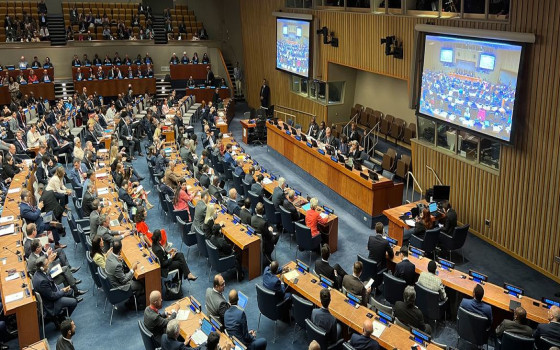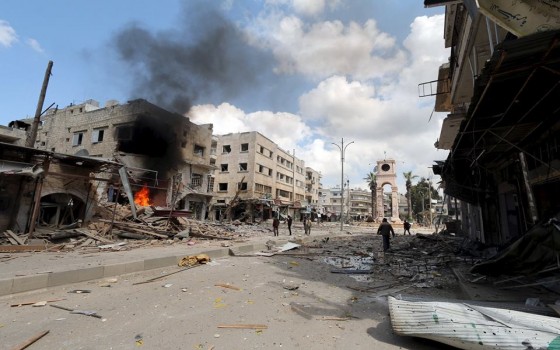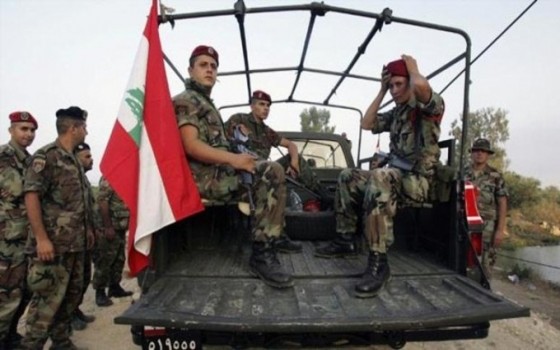
Arab states' statements at UN meetings focused on the Palestinian issue, along with migration and poverty.

- Europe and Arabs
- Sunday , 28 September 2025 9:17 AM GMT
New York: Europe and the Arabs
Speeches delivered by delegations of Arab countries participating in the United Nations meetings addressed several issues, most notably the Palestinian cause, including migration, poverty, development, climate change, security, the economy, and others.
Tunisian Foreign Minister Mohamed Ali Nafti expressed "a sense of disappointment and frustration at the Security Council's inability to put an end to the horrific humanitarian tragedy and the war of extermination and starvation to which the resilient Palestinian people are subjected, given the insistence of the brutal occupying entity to continue its abuse of them in full view of the entire world, without accountability or accountability."
In his address to the General Assembly, he emphasized that the "occupation's crimes" aim to liquidate the Palestinian cause and prevent the Palestinian people "from their right to resistance and to preserve their entire land."
He called on the international community to assume its responsibilities immediately to lift the siege on the Gaza Strip and all Palestinian territories, end the famine, and ensure "the effective delivery of aid."
He emphasized that his country believes in the ability of the United Nations to withstand the profound transformations taking place in the world and "to provide a measure of hope and optimism for future generations."
The Tunisian minister stated that the process of reforming the United Nations and establishing a new era of multilateralism can only be effective if it "enshrines the value of equality among human lives and avoids discrimination, selectivity, and double standards." He affirmed his country's continued support for the Palestinian people in their struggle to regain their legitimate and inalienable rights.
He stated that global challenges cannot be addressed without rebuilding international relations on the basis of solidarity, constructive cooperation, justice, and mutual respect. He reiterated his country's urgent call for a comprehensive reform of the international financial system and its institutions, ensuring "equitable access to financial resources" and enhancing the effectiveness of their use in the service of comprehensive development.
He called for adopting a comprehensive approach to migration that takes into account its humanitarian and historical nature. He emphasized the need to support development efforts in countries of origin, promote the economic and social integration of youth, and facilitate regular mobility.
He affirmed Tunisia's categorical rejection of "being a transit country or a land of residence for irregular migrants, victims of human trafficking networks."
He said that migration must remain a choice, not a necessity, emphasizing that if it is organized, "it enables the creation of wealth and decent job opportunities, preserves human dignity, and serves as a lever for development and cultural rapprochement between peoples."
Mauritanian Foreign Minister Mohamed Salem Ould Merzoug said that the current session of the General Assembly provides an opportunity to celebrate eighty years of achievements by the United Nations in serving humanity in various fields, and is also an opportunity to identify shortcomings.
He pointed to the disparity that divides the world into two parts: one is rapidly advancing towards the Fourth Industrial Revolution and artificial intelligence, while the other remains trapped in poverty and marginalization.
He warned that this gap, coupled with the rise of conflicts and wars, presents humanity with a difficult test that requires unified efforts to find solutions capable of bridging the gap by achieving just and comprehensive development centered on people and their right to a dignified life.
The Mauritanian Foreign Minister said that the "genocidal war" being waged in Gaza poses a fateful test for the human conscience and the credibility of the United Nations. He affirmed his country's support for the Palestinian people and reiterated that violence cannot bring sustainable security and peace to the Middle East.
While discussing the importance of balanced reform of the United Nations that restores confidence in it, he reiterated his commitment to the legitimate demands of the African continent for equitable representation in global governance structures.
He also discussed a number of Mauritania's achievements in the areas of governance, social protection, the economy, human rights, combating terrorism and extremism, and the transition to clean energy.
He conveyed Mauritania's call to the international community to support developing countries in addressing the challenges of food security, climate change, and debt problems, in support of their efforts to achieve the Sustainable Development Goals.
For his part, the Minister of Foreign Affairs of the Sultanate of Oman, Badr bin Hamad bin Hamoud Al Busaidi, stressed the need to move forward with the implementation of the two-state solution.
In his speech, the Minister said that the Palestinian issue is a top priority for the Sultanate of Oman. He called for sanctions to be imposed on Israel for its violation of state sovereignty and its flagrant violations of international law. He condemned the Israeli bombing of Qatar and affirmed solidarity with Doha.
For her part, UAE Minister of State for Foreign Affairs Lana Nusseibeh said that the UAE's first and urgent demand is for an immediate and permanent ceasefire in Gaza, an end to the blockade, and the release of hostages and detainees.
In her address to the 80th session of the United Nations General Assembly, Nusseibeh added, "We are facing a pivotal moment in a global landscape marked by turmoil and conflict." She noted that the UAE has chosen the approach of wisdom and de-escalation, harnessing all its capabilities to build bridges, prevent conflicts, and place the interests of peoples above all else.
Saudi Foreign Minister Prince Faisal bin Farhan also emphasized that the time has come to find a just solution to the Palestinian issue.
Prince Faisal added, in his address to the UN General Assembly, that "the two-state solution is the only solution, and the international community must shoulder its responsibilities to end the conflict," with regard to the Palestinian issue. Regarding the Syrian issue, Bin Farhan said, "We commend Syria's efforts, welcome the lifting of sanctions, and demand an end to Israeli attacks."
Regarding the Lebanese issue, he stressed the importance of restricting the possession of weapons to the Lebanese state, supporting its efforts in this regard, and the necessity of Israel's withdrawal from Lebanese territory.
He also emphasized the importance of stability in Sudan and freedom of navigation in the Red Sea.
The Saudi Foreign Minister called for "a zone free of weapons of mass destruction in the Middle East."
This came after Algerian Foreign Minister Ahmed Attaf said that the difficult circumstances facing the Middle East region require the UN Security Council to further coordinate with the League of Arab States, especially in light of the systematic aggression aimed at liquidating the Palestinian cause and the repeated attacks on the sovereignty and territorial integrity of neighboring countries. This came during Attaf's participation on Friday in New York in the interactive dialogue meeting between the Security Council and the League of Arab States, which falls within the framework of cooperation between the United Nations and regional organizations in the field of strengthening international peace and security, as enshrined in Chapter VIII of the UN Charter, according to the Algerian Press Agency (APS).












No Comments Found